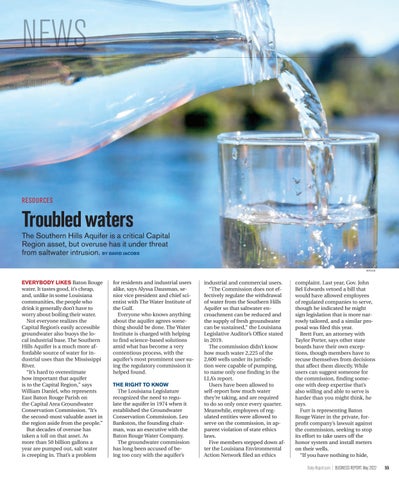NEWS
RESOURCES
Troubled waters
The Southern Hills Aquifer is a critical Capital Region asset, but overuse has it under threat from saltwater intrusion. BY DAVID JACOBS ISTOCK
EVERYBODY LIKES Baton Rouge water. It tastes good, it’s cheap, and, unlike in some Louisiana communities, the people who drink it generally don’t have to worry about boiling their water. Not everyone realizes the Capital Region’s easily accessible groundwater also buoys the local industrial base. The Southern Hills Aquifer is a much more affordable source of water for industrial uses than the Mississippi River. “It’s hard to overestimate how important that aquifer is to the Capital Region,” says William Daniel, who represents East Baton Rouge Parish on the Capital Area Groundwater Conservation Commission. “It’s the second-most valuable asset in the region aside from the people.” But decades of overuse has taken a toll on that asset. As more than 50 billion gallons a year are pumped out, salt water is creeping in. That’s a problem
for residents and industrial users alike, says Alyssa Dausman, senior vice president and chief scientist with The Water Institute of the Gulf. Everyone who knows anything about the aquifer agrees something should be done. The Water Institute is charged with helping to find science-based solutions amid what has become a very contentious process, with the aquifer’s most prominent user suing the regulatory commission it helped found. THE RIGHT TO KNOW The Louisiana Legislature recognized the need to regulate the aquifer in 1974 when it established the Groundwater Conservation Commission. Leo Bankston, the founding chairman, was an executive with the Baton Rouge Water Company. The groundwater commission has long been accused of being too cozy with the aquifer’s
industrial and commercial users. “The Commission does not effectively regulate the withdrawal of water from the Southern Hills Aquifer so that saltwater encroachment can be reduced and the supply of fresh groundwater can be sustained,” the Louisiana Legislative Auditor’s Office stated in 2019. The commission didn’t know how much water 2,225 of the 2,600 wells under its jurisdiction were capable of pumping, to name only one finding in the LLA’s report. Users have been allowed to self-report how much water they’re taking, and are required to do so only once every quarter. Meanwhile, employees of regulated entities were allowed to serve on the commission, in apparent violation of state ethics laws. Five members stepped down after the Louisiana Environmental Action Network filed an ethics
complaint. Last year, Gov. John Bel Edwards vetoed a bill that would have allowed employees of regulated companies to serve, though he indicated he might sign legislation that is more narrowly tailored, and a similar proposal was filed this year. Brett Furr, an attorney with Taylor Porter, says other state boards have their own exceptions, though members have to recuse themselves from decisions that affect them directly. While users can suggest someone for the commission, finding someone with deep expertise that’s also willing and able to serve is harder than you might think, he says. Furr is representing Baton Rouge Water in the private, forprofit company’s lawsuit against the commission, seeking to stop its effort to take users off the honor system and install meters on their wells. “If you have nothing to hide, Daily-Report.com | BUSINESS REPORT, May 2022
55-57 News.indd 55
55
4/28/22 2:13 PM















